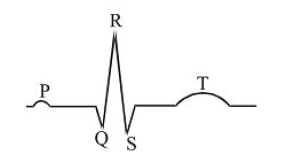
a. The P wave represent the electrical excitation of the_____
b. The QRS complex represents the ____ of the ventricles.
c. The end of T wave marks the end of _____
Video Solution
Text Solution
The correct Answer is:a. Atrical depolarization
b. Depolarization
c. Ventricular systole
|
Answer
Step by step video & image solution for a. The P wave represent the electrical excitation of the_____ b. The QRS complex represents the ____ of the ventricles. c. The end of T wave marks the end of _____ by Biology experts to help you in doubts & scoring excellent marks in Class 12 exams.
Updated on:21/07/2023Similar Questions
Knowledge Check
P-wave represents -
ADepolarization of ventriclesBRepolarization of ventricleCRepolarization of atriaDDepolarization of atriaThe end of the T-wave in ECG mark the
Abeginning of Ventricular systoleBend of Ventricular systoleCbeginning of atrial diastoleDend of atrial diastoleAssertion : The 'T-wave' represent return of the ventricle form excited to normal state.
Reason : The end of 'T-wave' marks the end of diastole.AIf both Assertion & Reason as true & the Reason is a correct explanation of the assertion.BIf both Assertion & Reason are True but Reason is not a correct explanation of the Assertion.CIf Assertion is True but the Reason is False.DIf both Assertion & Reason are false.

